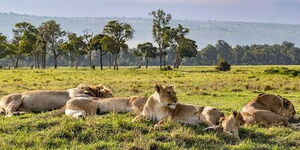The Kenyan tourism industry has faced challenges as stakeholders report a noticeable loss of bookings to neighbouring Tanzania, attributing the shift to ongoing protests.
Prominent figures in the tourism sector have voiced their concerns over the detrimental impact of these demonstrations on Kenya's tourism prospects during what should be a peak season.
Speaking on Citizen TV, Lisa Kibutu, a Board Member of the Kenya Coast Tourism Association, highlighted the competitive disadvantage Kenya is currently experiencing as compared to Tanzania.
"Kenya has single-handedly boosted tourism for Tanzania and they’re improving their game; we are losing bookings and investments to them," Kibutu stated.
Kibutu further explained that while cancellations have been minimal, there has been a stark absence of new business in the sector in the country.
"We’ve not had many cancellations, but there’s no new business while this is considered the height of the peak season. Hotels in Diani, Watamu, and Malindi are experiencing an occupancy rate of 80 to 90 per cent," she disclosed.
Mohammed Hersi, Former Chair of the Kenya Tourism Federation, emphasised the broader impact of media coverage on tourist perceptions, claiming that violence depicted in media has a ripple effect on the sector.
Hersi opined that tourism is the first victim of any violence in the country because visitors monitor different aspects before they travel
"Tourists become worried when they see disturbing headlines and images of violence from countries they want to visit. When there are clashes, tourism is the first to be affected and last to recover. Protests and tourism are incompatible because they disrupt those who visit for holidays and businesses," Hersi explained, stressing the incompatibility of tourism and civil unrest.
Mike Macharia, CEO of the Kenya Association of Hotelkeepers and Caterers, called for a strategic focus on tourism development despite the ongoing protests.
"Protests continue in various parts of the world, but we should prioritize tourism development," Macharia advised.
He reassured potential visitors by stating, "No tourists have been harmed," underlining the safety measures in place despite the anti-government protests.
Charles Gakuu, CEO of the Air Travel & Related Studies Centre, pointed out the far-reaching implications of instability on both leisure and business travel.
"Tourists visit for leisure and conferences; instability and disruptions prompt them to change plans. I urge Gen Z to cease protests and engage in dialogue with the government to support the tourism industry," Gakuu appealed.
He also highlighted the significant role of tourism in youth employment, noting that "around 75% of the tourism industry employs youth and Gen Z.












